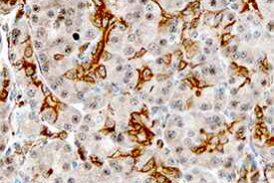Obesity is a global epidemic that causes millions of deaths each year; it is a chronic disease associated with other serious and chronic conditions, which include type 2 diabetes, coronary artery disease, stroke, cancer, and depression, among others. In a new study, researchers have discovered that the hormone Lipocalin-2 can reduce hunger, leading to weight loss; it can be a possible solution to obesity.
Key hormone that increases satiety
The hormone, which can suppress food intake and increase satiety in mice has shown similar results in humans and non-human primates, according to a new study published today in eLife. The study data suggest that Lipocalin-2 (LCN2) could become an effective and secure treatment for obesity. The hormone – called Lipocalin-2 (LCN2) – could be used as a potential treatment for obese people whose natural cues to feel satiated no longer function. LCN2 is produced predominantly by bone cells and occurs naturally in mice and humans.
The study
Studies in mice have shown that giving LCN2 to animals over a long period makes them reduce their food intake and prevents weight gain, without causing their metabolism to significantly slow down. “LCN2 acts as a satiety cue after a meal, leading mice to limit their food intake, and it does so by acting on the hypothalamus in the brain,” main author of the study, Peristera-Ioanna Petropoulou explained. She was a postdoctoral researcher at Columbia University Irving Medical Center, New York, USA, at the time the study took place, and collaborates now at the Helmholtz Diabetes Center, Helmholtz Zentrum München, Munich, Germany. “We wanted to see whether LCN2 has similar effects in humans, and whether one dose could cross the blood-brain barrier.” The team first analyzed data from four different studies of people in the US and Europe who were of normal weight, were overweight, or lived with obesity. The individuals in each study were given a meal after an overnight fast, and the amount of LCN2 in the blood was studied before and after they ate the meal.
The conclusions
The researchers found that in those of normal weight, there was an increase in LCN2 levels after eating the meal, which was in line with how satisfied they felt after eating.
In contrast, in overweight or obese individuals, LCN2 levels decreased after a meal. Based on this post-meal response, the researchers classified individuals as non-responders or responders. Non-responders – individuals who did not show an increase in LCN2 after a meal – tended to have a larger waist circumference and higher markers of metabolic disease, including BMI, body fat, increased blood pressure, and increased blood glucose.
However, surprisingly, it was found that people who had lost weight after a gastric bypass surgery recovered sensitivity to LCN2, changing their status from non-responders before surgery to responders afterwards. Altogether, these results reflect the results observed in mice and suggest that this post-meal LCN2 regulation impairment is a new mechanism that contributes to obesity and could be a potential target for weight loss treatments.
After verifying that LCN2 can cross into the brain, the research team explored whether treatment with this hormone could diminish food intake and prevent weight gain. To do so, monkeys were treated with LCN2 for a week. A 28% decrease in food intake was observed, compared to the situation before the treatment and one week later, and the monkeys also ate 21% less food than their peers who were treated with only a saline solution.
Furthermore, after only one week of treatment, measurements of body weight, body fat, and blood fat levels showed a descending trend in the treated animals. “We have shown that LCN2 crosses into the brain, reaches the hypothalamus, and suppresses food intake in non-human primates,” lead author Stavroula Kousteni concluded. She is a professor of cell physiology and biophysics at Columbia University Irving Medical Center. “Our results show that the hormone can restrict appetite with a minor toxicity and it can set the basis for the next level of testing with LCN2 for clinical use.”
Link: https://www.sochob.cl/web1/solucion-para-la-obesidad-hormona-que-reduce-el-hambre-y-conduce-a-la-perdida-de-peso/
Date: November 25th, 2020
Source: https://medicaldialogues.in
Reference: Petropoulou PI, Mosialou I, Shikhel S, et al. Lipocalin-2 is an anorexigenic signal in primates. Elife. 2020 Nov 24;9:e58949.
Nutrigenomics Institute is not responsible for the comments and opinions included in this article






